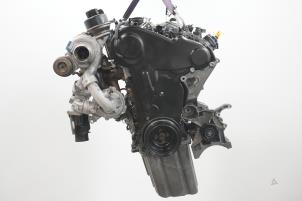Vital Considerations and Tips for Selecting the Right Engine for Your Needs
Choosing the appropriate engine is a multifaceted decision that requires careful factor to consider of various variables to make certain ideal performance for your particular needs. The intricacies of engine choice prolong past these fundamentals, triggering a more detailed assessment of important elements that can ultimately impact your fulfillment and success.
Determine Your Objective
Determining your purpose is a critical very first step in choosing the best engine for your requirements. Understanding the details application you desire will lead your decision-making procedure and ensure that you pick an engine that straightens with your operational demands. Whether you require an engine for a business automobile, industrial machinery, or a leisure task, each scenario needs different efficiency features and capacities.
Take into consideration the atmosphere in which the engine will certainly operate. Will it be subjected to heavy tons, severe temperatures, or extended usage? Analyzing these variables will assist you identify the needed power outcome, gas effectiveness, and durability needed to fulfill your goals.
Furthermore, consider the long-lasting ramifications of your choice. Spending plan restraints, maintenance requirements, and availability of parts are crucial factors to consider that will impact your overall satisfaction and operational effectiveness.
Inevitably, expressing your purpose will enhance the selection procedure and equip you to make an informed choice. By plainly defining your goals, you can review prospective engines better and select one that not just satisfies your existing needs yet likewise supports your future goals.
Evaluate Engine Requirements
As soon as you have plainly expressed your objective, the following action is to examine engine requirements. This process entails a thorough exam of various technological information that can substantially influence performance and suitability for your meant use.
Begin by assessing the engine's horsepower and torque rankings. Horse power is essential for identifying the engine's capability to carry out job, while torque is necessary for understanding how well it can deal with heavy tons or acceleration. Furthermore, think about the engine displacement, as it usually correlates with power outcome and efficiency.
Following, take a look at the engine typeâEUR" whether it is a gasoline, diesel, or alternate fuel engineâEUR" as each kind has distinct qualities and applications. Pay attention to the engine's arrangement (e.g., inline, V-type), as this can affect dimension, weight, and total efficiency.
An additional crucial facet is the engine's cooling system, which can affect dependability and upkeep demands. Lastly, evaluate the maker's track record and service warranty offerings, as these can supply insights into long-lasting efficiency and support. Thoroughly reviewing these specs will aid ensure that you choose an engine that aligns with your functional objectives and particular needs.
Take Into Consideration Gas Performance
Fuel efficiency is a vital element to consider when selecting an engine, as it directly affects operational prices and environmental sustainability. An engine's gas efficiency is generally gauged in miles per gallon (MPG) for lorries or in certain fuel usage (SFC) for airplane and aquatic engines. Higher gas performance not only reduces the amount of gas eaten however additionally minimizes greenhouse gas exhausts, making it a liable option for eco-conscious customers.
When examining engine choices, it is vital to evaluate the driving problems and meant usage. Engines optimized for highway driving may exhibit better fuel effectiveness contrasted to those developed for stop-and-go web traffic. Furthermore, think about see it here the engine's technology, such as turbocharging or hybrid systems, which can considerably improve fuel efficiency.

Assess Upkeep Demands

Some engines may need more constant oil adjustments, filter substitutes, or specialized servicing, which can affect your functional downtime. Engines with extensive appeal commonly have better parts schedule, decreasing lead times throughout repair services.
One more important aspect is the technological know-how needed for maintenance. Some engines might necessitate customized training for professionals, which might restrict your options for service suppliers. In addition, evaluate whether the engine's layout permits easy access to parts commonly needing maintenance, as this can considerably affect labor costs.
Spending Plan Your Investment
Recognizing maintenance demands is simply one element of selecting the ideal engine; economic considerations play a similarly crucial duty (amarok engine for sale). Developing a clear budget is essential, as it affects not only the initial acquisition cost yet also long-term operational expenses
When budgeting, consider both the ongoing costs and ahead of time prices such as fuel efficiency, maintenance, and prospective repair services. A seemingly inexpensive engine might incur greater costs gradually as a result of bad gas economic situation or regular maintenance requirements. Furthermore, review the accessibility and expense of spare components, in addition to their website the guarantees used by producers, which can provide monetary defense against unforeseen expenditures.
It is additionally wise to consider possible financing options or renting arrangements, which could minimize prompt financial problems. Balance your need for advanced attributes with your spending plan constraints, making certain that you invest in an engine that meets your performance needs without compromising financial security.
Ultimately, an all-round spending plan will encourage you to make informed choices, aligning your engine option with both your economic capacities and operational requirements, leading to an extra lasting financial investment in the lengthy run.

Final Thought
In conclusion, choosing the ideal engine necessitates a comprehensive understanding of certain needs and applications. Careful examination of engine requirements, gas efficiency, and maintenance needs is necessary for informed decision-making.
Gas effectiveness is an important element to consider when selecting an engine, as it straight influences functional costs and ecological sustainability. An engine's gas efficiency is generally gauged in miles per gallon (MPG) for automobiles or in particular gas usage (SFC) for aircraft and aquatic engines. Diesel engines typically provide far better gas effectiveness than gasoline engines. Inevitably, selecting an engine with a solid focus on gas efficiency can lead click over here now to significant long-lasting savings and add positively to ecological efforts. Cautious evaluation of engine specifications, gas efficiency, and upkeep needs is necessary for informed decision-making.